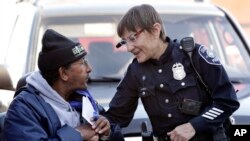U.S. civil liberties groups on Tuesday called on Amazon.com Inc. to stop offering facial recognition services to governments, warning that the software
could be used to target immigrants and people of color unfairly.
More than 40 groups sent a letter to Amazon Chief Executive Officer Jeff Bezos saying technology from the company's cloud computing unit was ripe for abuse. The letter underscores how new tools for identifying and tracking people could be used to empower surveillance states.
Amazon has marketed a range of uses for its Rekognition service, unveiled in late 2016. These include detecting offensive content, identifying celebrities and securing public safety.
In a blog post last year, Amazon said a new feature let customers "identify people of interest against a collection of millions of faces in near real-time, enabling use cases such as timely and accurate crime prevention."
Customers provide the data for Amazon's tool to search.
"Seconds saved in the field can make the difference in saving a life," Chris Adzima, an analyst in the Washington County Sheriff's Office in Oregon, said in the blog post.
Freedom from being watched
But rights groups say the powerful tool raises concerns.
"People should be free to walk down the street without being watched by the government," said the letter to Bezos. "Facial recognition in American communities threatens this freedom. In overpoliced communities of color, it could effectively eliminate it."
Amazon has helped various U.S. jurisdictions use Rekognition, said the letter, citing public records obtained by affiliates of the American Civil Liberties Union.
In Oregon, law enforcement uploaded 300,000 mug shots dating to 2001 into Amazon's cloud and indexed them in Rekognition, according to another Amazon blog post.
Rekognition identified four faces with more than 80 percent similarity to an image of an unidentified hardware store thief; a Facebook search subsequently helped with the case, the post said.
The City of Orlando Police Department has also used Rekognition, according to Amazon's website.
In a statement, Amazon Web Services said, "Our quality of life would be much worse today if we outlawed new technology because some people could choose to abuse the technology."
Amazon requires customers to abide by the law and be responsible when using Rekognition, it added.
The world's largest online retailer is not alone: Microsoft Corp and Alphabet Inc.'s Google offer recognition services as well.
Identifying faces has become a common feature in consumer products from Apple Inc. and Facebook Inc.





